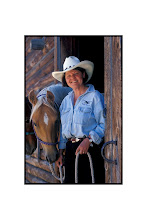Dear
Roundup Participants,
I can't be with you tonight because I am cooking for hunters in a tent in
the Scapegoat Wilderness. Although I am somewhat concerned about being eaten by
a grizzly bear in a cook tent that reeks of bacon grease, I am more concerned
about making enough money at my extreme cooking job this week to buy a month's
worth of Crystalyx supplement to help our cows get through this drought.
As a ranchwife, my primary function is to supplement the income from the
sale of our calves to keep the cattle healthy, the bills paid, and meet the
annual land payment. Even though the ranches we operate now have been in our
families since the early 1900's and both my husband and I are fourth generation
Montana ranchers, we still have to work hard on and off the ranch to keep it
solvent.
We started out 30 years ago with 25 cows, a couple jobs in town, some leased
ground, and a dream to own our own ranch. Three factors made that dream a
reality--the recession of the 80's that allowed us to buy a small place over
across the river, inheritance of two nice places from family members that
placed deathbed trust in us to hold on to the places they had created with
sweat and perseverance, and the fact that we are too stubborn to admit that our
ranching dream is sometimes more like a nightmare.
For example, last year, a year of record rainfall, our summer pasture and
our home place suffered more flood damage than the value of the calf crop. This
year, we sold calves for record high prices right in the middle of a wildfire
that burned up 1300 acres of our pasture, several miles of fence, and left a
huge mess to clean up including 5 charred outbuildings. Fortunately, despite
the drought and the fire, we will be able to hold on to our cows barring
another bad hand dealt by Mother Nature. Being gamblers, we are going to double
down and bet she deals us some aces in the form of normal moisture in the next
year. Only God knows if it will rain, so the fate of our ranch is literally in
His hands as it has been every year for the hundred plus years our families
have been ranching in Montana.
Ranchers don't get days off. They don't get to sleep in. Our family
vacations consist of attending a bull sale in a neighboring state. Our
investment is at risk from the economy, the weather, fluctuating prices, death
loss from illness and predators, governmental regulations, radical environmental
groups, noxious weeds, grasshoppers, wildfires, and floods to name just our top
ten.
Four generations of our family currently live on the ranch, and we want
to pass it down to the fifth and sixth generation, our kids and grandkids. That
will not be possible if the Death Tax is not reformed. If a bear eats me this
week and that causes my husband to have a fatal heart attack, our children will
have to sell the ranch to pay the inheritance tax, and that is just plain wrong
since their ancestors will have paid over a hundred years of property tax on
that property.
I am not trying to evoke your sympathy, because we chose this profession,
and we can walk away from it if we choose to do so. I am trying to explain our
motivation as something other than the I word (insanity), so I will
propose that we do this because we love the land, the livestock, and the
lifestyle enough to lie awake at night trying to figure out how to hang on year
after year and pass the ranch down to the next generation. Bottom line is that
as a profession, ranching defies logical explanation. I cannot explain why this
choice makes sense to us nor why our children want to follow in our footsteps,
but the next time you eat a burger, I hope you will have a better understanding
of the insane people who made that burger tasty, affordable, safe, healthy, and
plentiful. Enjoy your ranch visit and know that I really do wish I could have
been there!
Note
from Susan Metcalf at the Lower Deer Creek Ranch:
Every
year, Bob and Susan Burch, who own the Hobble Diamond Ranch across the river
from us, host an amazing Literary Arts Roundup at their ranch. They invite
students from their other hometown of Philadelphia to join students from our
area to stay at the ranch and explore fine arts with professional artists,
writers, photographers, and actors. Their generosity and courage in hosting
that many teenagers is astonishingly commendable.
This year, Kathy Agnew, my former English teaching colleague, invited me
to do a little presentation at the Roundup on what it is like to be a ranch
wife, because suffice it to say that a visit to the Hobble Diamond is not an
immersion into the reality of the average rancher's life. Unfortunately, I
can't attend the Roundup, because I will be cooking in hunting camp.
Nevertheless, I decided I would sit down and pen a few comments to the
participants.
“Cooking
in the West” routinely appears in the Western Ag Reporter, which covers the 14 northwestern states and is
considered the best read ag publication
in the West.

